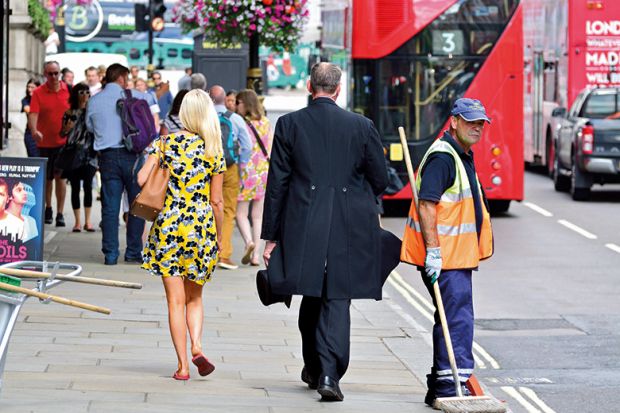Over the past year and a bit, I have watched the academic world (in all disciplines) flail around at Brexit, at Donald Trump and, this summer, at the Grenfell Tower fire. “How could these tragedies have happened?” they cry.
It is clear that this middle-class, liberal, highly educated section of society did not see these events coming.
I have written previously on how academics – for all their erudition and knowledge – do not see the everyday troubles of working-class people. They have strongly denied this, blaming “poor polling” and inaccurate responses from people who have taken part in their surveys. But the truth is clear for any of us who have come from working-class families and communities: the middle-class academic elite are totally out of touch. And no balancing of their surveys is going to change that.
As a working-class academic and ethnographer, I was not at all surprised when Brexit happened, when the vote – especially in working-class communities – swung to “Leave”. In fact, if it had gone the other way I would have been shocked. I have spent years in working-class communities in Nottinghamshire and in London with people who just cannot take any more excuses, lies and empty rhetoric from their supposed political representatives.
Being told that change will come, but in five years, or two years, with the next general election, is not good enough when even one year is too far away for women who are facing immediate eviction from London and being moved away from their families. The people who live in the Nottinghamshire mining communities have not seen their elected representatives for years because those MPs have been far too busy in Westminster. Meanwhile, their communities are being taken down to the lowest level of dignity, having to work in warehouses for Sports Direct and Amazon – and they can’t stomach voting for any political representative who they feel is not physically or spiritually present in their communities.
And as Grenfell Tower burned in June, those of us who work within grass-roots and community campaigns in housing in London knew and feared this outcome. Many in my profession, however, did not. As I listened to a sketchy news bulletin at 2am on 14 June, reporting a fire at a tower block in West London and people jumping out of windows to escape, all I could think was that the building’s inhabitants were considered by large sections of society to be “not good enough”. They were not valued.
I have researched council estates and the views that both officials and wider society have held against people who need social housing. I knew that this lack of care, and the contempt for working-class people living in council tower blocks (especially in London, which is undergoing industrial-scale class cleansing), would eventually end in a disaster.
However, I was aware that the academic community in general did not see any of this coming. I have asked myself why the experts at our most prestigious universities fail to think about and write about the lives of the poorest people in our society. Does the constant march forward by a neoliberal university sector that is obsessed with metrics, scores and a false prestige mean that they are missing the small stories that ethnographers take years to build up?
The constant competition to publish mostly unfinished work in academic journals means that the wider story, the bigger issues that are affecting society, can never be thought through properly. And saddest of all is that working-class students, who are rooted in their communities and people and who could help to highlight the topics important to them, see nothing but the high, unjust prices now demanded by our universities – especially at postgraduate level.
If we value academic research, and if we want to know what is happening to the poorest people in our society, academia needs to change, and change significantly. The pressure to publish or perish before our work is properly thought through needs to end. The narratives that are collected with care and over years by ethnographers need to be valued far more highly than they are now. After all, it was the ethnographers who saw Brexit and Trump coming. But most importantly, we must support and help the next generation of working-class researchers to find a place in academia. Without them, we are irrelevant.
Lisa Mckenzie is research fellow in the department of sociology at the London School of Economics.
Register to continue
Why register?
- Registration is free and only takes a moment
- Once registered, you can read 3 articles a month
- Sign up for our newsletter
Subscribe
Or subscribe for unlimited access to:
- Unlimited access to news, views, insights & reviews
- Digital editions
- Digital access to THE’s university and college rankings analysis
Already registered or a current subscriber? Login







